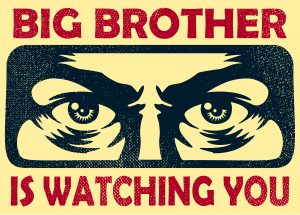Let’s just take a second to be thankful. The internet is pretty great when you think about it. Some of the most interesting things you read and discover are only available to you online.
Maybe you watched a cool documentary, streamed an intense sports event (it was never offside, ref!), or just found out the latest news on your favorite celebrity.
I know, I know. $50 for socks? You can’t be serious. 🙄
On average, people spend around 8 hours online every day. The internet has become such a basic and central part of our lives; we may even forget how lucky we are to have it in the first place.
After all, not everyone in the world has it quite so good.
Admittedly, though, it’s not all sunshine and rainbows in the digital space. And there are plenty of reasons for us to lose trust and become cynical when it comes to life on the web.
Fake news, misinformation, bots, phishing, spoofing, spam, the list goes on and on.
But do you know which websites you should trust and which you shouldn’t? And why is trust an essential part of the online world?
Let’s explore the state of trust on the internet today.
As well as some of the tell-tale signs you can look out for while you stalk Kanye West browse online.
What was the internet like in the beginning?
The original purpose of the internet depends on who you ask. Or perhaps, more accurately, where you ask.
In the U.S., you’ll probably hear that the internet can be traced back to the ARPAnet project. Born out of the Cold War and a desire to have a flexible communication system, it meant that if one communication center went down or was destroyed, another nearby router could be quickly chosen. Allowing communication to continue without disruption.
Meanwhile, in Europe, the internet developed down an entirely different path. It was primarily seen as a way to help researchers and scientists collaborate remotely. Eliminating the need to travel to use remote resources.
Despite having separate ideas for implementation, both cases have the same thing at the core: remote communication and sharing of information.
Today, the world wide web is a global business place. It’s where we perform many of our work tasks, where we communicate with our friends and family, where we trade, shop, even where we get entertained.
It dominates a massive part of our lives.
What does trust mean in the online world?
Trust is hard enough to define in general terms, never mind when it comes to the digital world.
You probably trust your bank to handle your account and savings. You’re also likely to trust your doctor to prescribe the right medication or treatment. But can you place the same level of trust in the world wide web?
The answer, if you’re sane, is a definite no.
New kinds of relationships and communities are in play due to the rise of the internet and social media.
Along with them come new ways in which trust must be negotiated and established. Whether that’s with anonymous profiles on social media and forums or online organizations you may want to do business with.
The internet is a place that explodes with rushes of information. And not all of it is produced by trustworthy sources.
We all know by now that websites use several strategies to capture your attention.
They prey not only on our natural human curiosity but on the gullible nature of the unsuspecting. Specific images are chosen to draw our eyes, and emotional language is designed to create a specific psychological response.
The sour cherry on top of this internet cake is that the digital landscape also serves as the perfect playground for malicious actors to compromise your privacy through constant surveillance and potential cyber attacks.
The escape clause

IRL, you choose a certain bank or a particular doctor according to your own reasoning.
However, there are other options available to you. Choosing to switch to a different bank or a different doctor is a possibility if you make that decision.
You can’t do the same thing with the internet.
Some choice might exist when it comes to the Internet Service Provider you pay for the connection service, but that’s it.
There’s only one internet. And you get the same experience no matter who your provider is.*
*Unless you’re the victim of ISP throttling, which is why Net Neutrality is really quite important.
The expectations we set for the internet are subjective and diverse.
One person may primarily use the internet for research and educational purposes, while another is entirely focused on chatting with friends and streaming various forms of entertainment.
Both good things and bad things can happen while we do this.
We might stumble upon the funniest thing ever seen, or we might find out that our data has leaked on the dark web.
Just think about how easily we can lose track of how many things we do online; from checking the weather to making online transactions, we constantly browse the web. Even when we don’t know what we’re looking for.
It’s impossible to know what actions will come back to bite you.
Plus, in most cases, when bad things do happen, you can’t ask your ISP to take care of it for you. Their job is to give you a connection. That’s it.
You’re the one that has to take action. Starting with knowing how to defend yourself and figuring out how you decide to place trust in the internet.
You can be a different person online

Like most things in this world, anonymity can be used for both good and evil.
There is no argument that it’s a vital tool for those whose identity needs to be screened.
Investigative journalists, whistleblowers, those in witness protection programs, and the victims of stalking or domestic violence all fall into this category.
However, anonymity also allows hidden malicious actors to take advantage of everyday internet users.
People can lie, come up with totally different identities and personas, behave abhorrently, and in many cases get away with it.
We’ve all heard the horror stories; whether it’s child predators posing as children, or faceless accounts stalking and harassing victims, anonymity certainly has its dark side.
Some countries are seeking to force internet users to disclose their real identities to overcome these pitfalls. However, the privacy implications are clear for all to see.
All of a sudden, websites that currently offer little value to hackers, because no personal information is required to sign up, are now turned into potential gold mines with real names, dates of birth, and IP addresses all linked together.
Those journalists, whistleblowers, and victims all become fully exposed too.
This is precisely why internet regulation on matters like this needs to be well thought out. While many laws may be passed with the best of intentions, they can easily produce unintended consequences that are even more damaging.
How has trust in the internet changed and evolved?
In 2011, while writing for the Wall Street Journal on the Insidious Evils of Like Culture, Neil Strauss laid out the following view of the early internet:
When the internet first came into public use, it was hailed as a liberation from conformity, a floating world ruled by passion, creativity, innovation, and freedom of information.
As you can probably tell from the title of his article, it’s not something that he still believes to be true. Particularly regarding the liberation from conformity, with social media ‘like’ culture encouraging large groups of people to settle on the same opinions.
Trusting social media companies is also not generally deemed to be the wisest move. They feed on you, extracting as much data as they can to gain new insights for advertisers.
And all this data, from billions of users around the world, gives them a lot of power.
How much power, exactly? Well, enough to influence political elections and 63% of internet users believe that it’s too much.
When you have this combination of factors, an online phenomenon, so central to how people use the internet, that you believe cannot be trusted and also has too much power, it’s no surprise that trust in the internet as a whole begins to fall.
Digital design strategist Louisa Heinrich, the founder of Superhuman Limited, sums it up nicely in her contribution to the Pew Research Center’s 2017 post on The Fate of Online Trust in the Next Decade:
I fear trust will be diminished (i.e., we will be certain we are being watched, that our communications and interactions are not secure) but we will use the technology anyway, either because we have no other choice or because it’s just too convenient.
We can see her fear unfolding all around us. And it’s becoming more and more apparent in how we use internet services.
According to a survey by World Economic Forum, 31% of U.S. online users have avoided or stopped using a service because they felt they did not have control over their data.
A 2017 Knight-Gallup survey also revealed that half of U.S. Internet users are worried about companies watching their online behavior, while 38% fear they are monitored by the government.
How websites and advertisers track your every move
Websites track you in many ways, and one of the easiest things they can detect is your identity when you log in.
Virtually nothing you do online is private.
Google is the undisputed world champion when it comes to tracking.
Cookies track your activities across sites, website analytics and tracking software are also used to collect data relating to your on-site behaviors.
Websites can also identify you based on your IP address which reveals your whereabouts – not down to street level, but generally your city or area.
On a deeper level, every computer has its unique fingerprint that can be logged to identify you. Battery status (including the rate it depletes), the size of your browser window, and more can all be tracked because no two computers are exactly the same, even if they are the same model.
Facebook even has code that can track you across the internet, regardless of whether you ever sign up for an account on its platform. Over 40% of free Android apps, and a similar number of iOS apps, send user data back to the social media giant.
What websites do with all this information is put all the puzzle pieces together in an attempt to create a complete user profile of you.
They then sell this information to third parties such as advertisers or even hand it over to government agencies (particularly in non-democratic countries).
Google is the undisputed world champion when it comes to tracking.
In 2012, the company changed its privacy policy, making it possible and legal to share your data between different Google services (Gmail, Google+, YouTube, Google Maps and more).
This means Google knows where you’ve been. Google knows everything you’ve searched for and deleted. All the apps you use. And your entire YouTube history.
The potential implications are scary. Especially when you consider they are still working on Project Dragonfly, with the aim of releasing a censored search engine for use in China.
I mean, it’s not like Western search engines have ever been found to be complicit in Chinese human rights abuses.
How data breaches undermine trust in the internet

Data breaches are becoming more and more common in the digital world, and the volume of cyber attacks that cause them continues to skyrocket.
There’s even a risk that we may become numb to them, just accepting that they are part of internet life.
You may already be aware of the biggest breaches that have taken place over the years, but plenty of smaller instances are also cause for alarm.
Whether it’s the dating site you use to meet new people or the restaurant you meet at after exchanging a few messages online, your personal information can be at risk the entire time.
Even the popular video game Fortnite came close to being exploited.
Everywhere you turn, and whatever you use the internet for, the data you hand over could end up in the wrong hands.
White hat hackers and cybersecurity professionals do a fantastic job of finding and disclosing vulnerabilities, as well as developing solutions to counter specific attacks.
But one thing is sure: the more developed the internet has become, the more unsafe it’s turned out to be.
Do the reasons behind mass surveillance make it worth it?

Since the September 11 attacks, the U.S. government has started to introduce various laws that would allow them to monitor people’s online activities. The U.S. presented these reforms as a solution to fight terrorism.
Initially, not many believed this to be a problem. But when Edward Snowden revealed the NSA’s secret in 2013, people worldwide began to worry.
No one likes the idea that a national intelligence organization collects information off their phone records and emails.
You could watch entire villages and see what everyone was doing. I watched NSA tracking people’s internet activities as they typed. I became aware of just how invasive U.S. surveillance capabilities had become. I realized the true breadth of this system. And almost nobody knew it was happening.
A similar situation is playing out in the UK with the Snooper’s Charter. This legal act allows government agencies to access citizens’ online activities under certain circumstances.
And in France, a surveillance law introduced in 2015 was judged by the UN to be “excessively broad and intrusive” due to the powers given to intelligence agencies, which include phone-tapping and computer-hacking.
The justification was made based on national security following several terrorist attacks in Paris, including at the satirical newspaper Charlie Hebdo and a Jewish shop.
However, the most disturbing and pervasive example is the Chinese government’s system of rating its citizens based on an Orwellian surveillance scheme.
The government monitors people’s daily activities constantly, and according to how “well” they behave, they earn more points or ‘Social Credit.’ The overall score either helps or prevents people from getting a job or a bank loan.
Often, such measures are taken in the name of national security, or to defend against a perceived threat.
And in cases where the laws are passed in the wake of traumatic events, they are often rushed through, riding a wave of support charged by heightened emotions and panic.
It’s easy for privacy concerns to get drowned out, but that doesn’t mean they should.
National security is undoubtedly a key issue for every nation in the world. But at what point does the price we are expected to pay become too high?
Perhaps, it’s when we begin sacrificing our own fundamental rights.
Original article published by Dana Vioreanu 8/6/2018, updated by Tom Bradbury 4/25/2019.



Leave a comment
Sally G
Posted on 07/05/2019 at 20:56
I believe I am pretty aware of cybersecurity, at least for a member of the general public, and do my best to “silo” my social media accounts, clear cookies, etc., but I believe that anonymity is critical, just as it is in real life with reading newspapers, buying in local stores with cash, etc. The ubiquitous data-mining and the potential with the so-called Internet of Things is horrible. I am currently fighting to keep a nonREAL-ID license option in New Jersey—the REAL-ID database is just another centralized magnet for would-be hackers to steal more data; the feds already have my passport data, leave driver’s licenses to the states, where they have been.
Tom Bradbury
Posted on 10/05/2019 at 14:37
Hey Sally 🙂
Thanks for the comment! Certainly sounds like you’re on top of things regarding your online presence.
We are starting to see some moves to regulate IoT and increase privacy / security there (see California and the UK). However, you’re absolutely right that the potential for surveillance and even deeper data mining is pretty scary.
Hopefully, in the coming years, we’ll see more and more awareness from governments and companies about the importance of privacy. But we may always be contending with the fact that technology advances too rapidly for lawmakers to keep up.
All the best in your fight for NJ license options. As you say, one worry is the creation of another centralized target for hackers. The federal database will likely be compatible with facial recognition tech too, which is totally not alarming in any way. 🙄